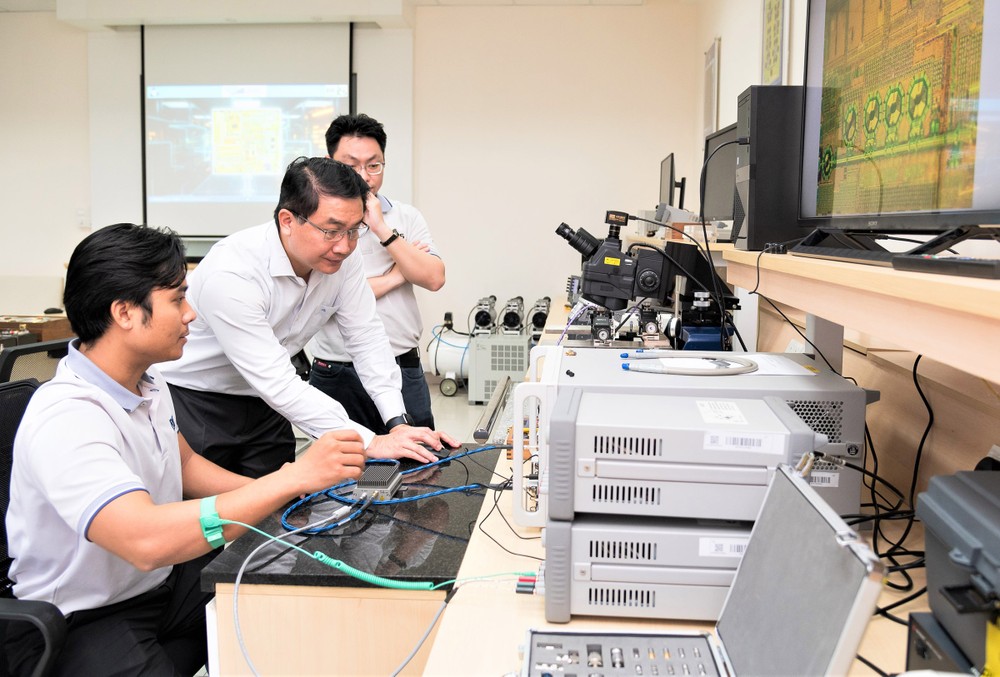
In response to the Politburo’s Resolution No. 57-NQ/TW on breakthroughs in science, technology, innovation, and national digital transformation, universities and research institutes are rapidly developing action programs and setting goals for human resource development, scientific research, and innovation. These institutions are prioritizing the creation of programs to align with the directives of Resolution 57.
Schools quickly develop an action program
Deputy Minister of Education and Training Associate Professor Hoang Minh Son stated that following the Politburo's issuance of Resolution 57, the Ministry of Education and Training contributed to drafting an action program, leading to the Government's issuance of Resolution No. 03/NQ-CP on January 9, 2025, which outlines the Government's action plan for implementing Resolution 57.
The Ministry of Education and Training has urgently developed and issued a plan to implement Resolution 57 and Resolution 03, including 33 specific tasks assigned to departments and bureaus under the Ministry of Education and Training to take the lead in organizing the implementation throughout the sector. The Ministry of Education and Training held an online conference on February 6, connecting with 63 departments of education and training and all universities and pedagogical facilities to disseminate the key tasks.
Professor Nguyen Thi Thanh Mai, Vice President of the National University of Ho Chi Minh City, said that the institute is responsible for developing a specific action program, solutions and assessments to implement Resolution 57 on breakthroughs, development of science, technology, innovation and national digital transformation.
Ho Chi Minh City National University has just organized a seminar to disseminate regulations on the organization, implementation and management of science and technology tasks at the university level and to deploy the implementation of Resolution 57. The seminar focused on discussing and proposing solutions to improve potential, effectiveness of research products, quality of scientific publications and building effective financial mechanisms to complete the action program to implement Resolution 57.
Professor Nguyen Minh Ha, Principal of Ho Chi Minh City Open University, informed that in order to thoroughly implement Resolution 57, the university council has urged leaders of faculties to review and develop programs and target plans that closely follow Resolution 57’s contents. After that, the university will synthesize and develop a common target program for its general goals.
Creating breakthrough policies on human resources and research
Professor Nguyen Dinh Duc, Chairman of the Council of the University of Science and Technology (VNU-Hanoi), explained that Resolution 57 aims to leverage digital transformation, high technology, and innovation as key drivers to propel Vietnam into a prosperous and powerful developed nation. He emphasized that the development of high technology and science and technology is considered the foundation and core value in achieving this vision.
Professor Duc stressed that scientists, universities, and research institutes are crucial to the success of Resolution 57's goals. He argued that without drastic innovation within universities, higher education will stagnate, hindering the development of science and technology and ultimately preventing Vietnam from achieving the desired outcomes outlined in the resolution.
According to Professor Nguyen Dinh Duc, 2025 will be a pivotal year, as universities and research institutes launch a new 5-year period aligned with the country's national development agenda.
Vietnamese universities must decisively realign their development strategies to successfully enact the directives set forth by the General Secretary and the Politburo.
He emphasized the key tasks including improving the quality of scientific research, creating works of global influence; developing a team of highly qualified lecturers and scientists; closely cooperating with businesses; promoting digital transformation, investing heavily in infrastructure, technology and the innovation ecosystem.
Associate Professor Lam Quang Vinh, Head of the Department of Science and Technology at VNU-HCM, stated that their action program for implementing Resolution 57 will prioritize research groups working on large and groundbreaking projects. The focus will shift from individual research topics to those proposed and approved by interdisciplinary councils. This will help the implementation of Resolution 57 at VNU-HCM achieve the best results.
First of all, VNU-HCM will work with other units to develop a pilot policy to assign units to preside over and take charge of research programs with high applicability. Projects and research programs will be contracted to the final product, reducing the burden of payment procedures, infrastructure investment, and human resources.
























